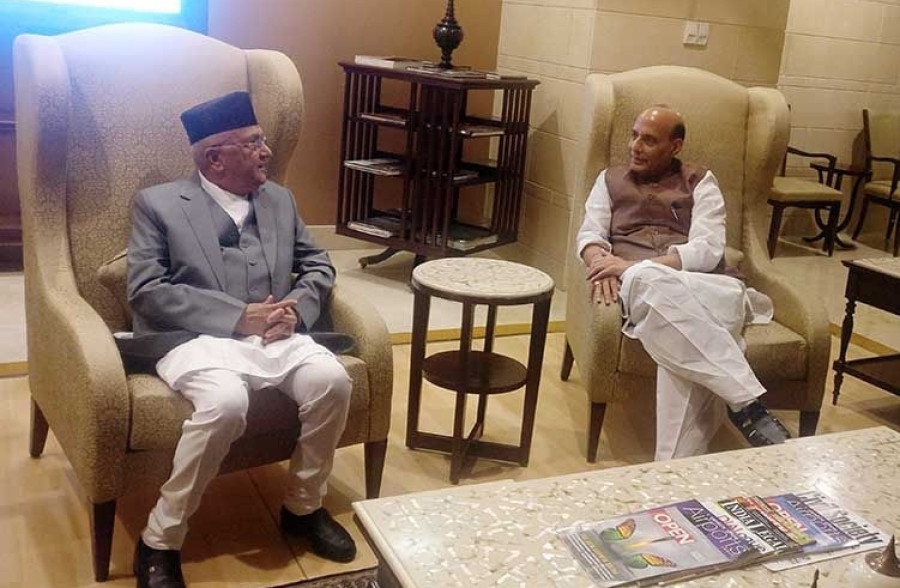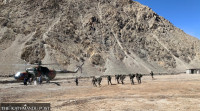National
Government pushing constitutional amendment in Parliament hardens positions on both sides of the border
Once the amendment passes, the new political map will be enshrined in the constitution, leading India to also take up a more inflexible position on the boundary, pundits say.
Anil Giri
Now that the government has tabled an amendment to the constitution to update the map of Nepal in the national emblem, positions in both India and Nepal have hardened to the point where diplomatic talks are unlikely to take place in the near future, say diplomats and ruling party leaders.
With all of the political parties on board, the amendment is likely to pass easily, cementing Nepal’s claims to Kalapani, Lipulekh and Limpiyadhura in the constitution and solidifying Nepal’s position. This will likely only lead to India becoming more inflexible, according to one ruling party leader.
“After the primary opposition Nepali Congress decided to vote in favour of constitution amendment, chances are now very slim that New Delhi will hold talks anytime soon with Kathmandu,” he said.
Narayan Khadka, the shadow foreign minister of the Nepali Congress, reiterated the ruling party leader’s assessment, saying that talks with India at this juncture are nigh impossible.
“The situation has become more complicated after we decided to amend the constitution,” said Khadka. “I don’t think Oli is ready to resolve the issue because it is a solid political tool to cover up all of his messes as prime minister and a good card with which to go into elections.”
According to Khadka, India is unlikely to budge from its claim on Kalapani, as the area has strategic military value. New Delhi is more likely to negotiate on Susta while ignoring the other disputes, he said.
Susta, located in southern Nepal, is another disputed area between Nepal and India.
While both Nepal and India appear to be waiting to see who blinks first, analysts and party leaders all say that the solution to the boundary dispute is through diplomatic talks. But with India refusing to sit for even virtual talks, citing the ongoing Covid-19 pandemic, Nepal has been compelled to resort to back-channel negotiations.
Embassy sources confirmed the meeting but refused to discuss the content of the meeting.
Multiple sources inside the ruling party told the Post that Baskota later told Prime Minister Oli that India was not going to take any harsh measures against Nepal.
While the rhetoric from both sides has lessened somewhat, the constitutional amendment now stands as an obstacle to talks.
“But at least there has been a change in tone from both sides,” said former foreign secretary and ambassador Madhu Raman Acharya. “Talks should happen and diplomacy should be given due importance. Had we started talks in November when India first came up with its new political map, we would have reached a conclusion by now as to how we can move forward.”
According to Acharya, Nepal is at fault for not pushing harder for talks but India too has pushed things farther by refusing to sit for talks.
“If both sides had sat for talks, Nepal would probably not have published the map,” he said.
Nepal published a new political and administrative map that includes all disputed territories as its own on May 20. Earlier, in November, India published its own political map showing Kalapani within its borders.
As the prospects for talks continue to dwindle, Oli, who had long cultivated good relations with Delhi before taking on a hard nationalist stance in 2015, has mobilised back-channels in the Indian capital, which includes senior Bharatiya Janata Party leaders, members of the Indian diplomatic community, and businesspersons, according to leaders from the ruling party.
However, these back-channel negotiations have yet to result in anything tangible.
On Saturday, during an interview on Indian television, Indian Defence Minister Rajnath Singh, whose inauguration of a new link road via Lipulekh had kicked off this entire fiasco, said that he is aware of the unfolding situation in Nepal.
“We are like family members and relatives and if we have any differences, we will sort them out through talks,” he said.
But not everyone is convinced that talks will be held. There are many who believe that India will simply wait until the issue fizzles out and the status quo remains unchanged. That was the approach it took in November, when protests had broken out over India’s encroachment of Kalapani.
“We are in favour of talks with India but we are afraid that Oli might halt negotiations with New Delhi on the grounds that we already have a map now,” said Khadka, the Congress leader. “If you ask me whether there is any possibility of talks with India, my answer would be ‘no’.”




 21.45°C Kathmandu
21.45°C Kathmandu















